|
|
|
Sort Order |
|
|
|
Items / Page
|
|
|
|
|
|
|
| Srl | Item |
| 1 |
ID:
168483
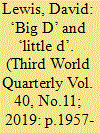

|
|
|
|
|
| Summary/Abstract |
Confusion between the idea of development as purposeful intervention and development as outcome has been addressed by efforts to distinguish ‘intentional’ from ‘immanent’ development, and the distinction between ‘big D’ development as Western post- World War Two modernisation in the Global South, and ‘little d’ as the creation of winners and losers within unfolding capitalist change. As a heuristic device this distinction has been put to a variety of uses within development studies, but it has rarely been subjected to further scrutiny. This paper asks (1) whether the distinction remains coherent or risks being stretched too far, and (2) whether it remains relevant within the changing landscape of twenty-first century development. It first traces the historical evolution of the distinction, and then presents an exploratory case study of Bangladesh’s garment sector in order to analyse the relationship between the two kinds of development empirically, identifying a number of contradictions and ambiguities. It finds that while the ‘D/d’ distinction remains useful at a general level, further conceptualisation is now needed, and its relevance may fade as the significance of Western aid declines.
|
|
|
|
|
|
|
|
|
|
|
|
|
|
|
|
| 2 |
ID:
168486
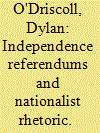

|
|
|
|
|
| Summary/Abstract |
Using the case study of the Kurdistan Region of Iraq (KRI) and the 2017 independence referendum, this article examines the nexus between independence referendums, nationalism and political power. It argues that the referendum in the KRI was held due to internal political competition and growing rebellion from the population against the poor economic performance and political situation rather than because the time was right for independence referendum. Focusing on the poor political and financial dynamics, as well as the lack of regional and international support for Kurdish independence, the article argues that independence was not a realistic goal and was rather used as a distraction amid internal turmoil. The example of the referendum in the KRI poses questions about the democratic credibility of such referenda, as the population were voting for an unachievable result and the referendum itself became a tool of internal political competition.
|
|
|
|
|
|
|
|
|
|
|
|
|
|
|
|
| 3 |
ID:
168482
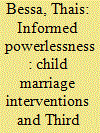

|
|
|
|
|
| Summary/Abstract |
Child marriage has gained increased international prominence over the past decades. Organisations working with the issue have promoted empowering girls as the best strategy to address it. Informed by postcolonial feminist theory, this article will locate these discourses in broader ‘turn to the girl’ and ‘turn to agency’ in international development, analysing how Third World girlhood, agency, resistance and voice are conceptualised. Girls are constructed as threatened by their families and communities, with agency exercised through resistance and materialised by their voice. I argue that this ignores the complexity of decision-making processes and broader structural factors related to child marriage, so that interventions providing ‘empowerment-as-information’ for girls to be agents of change instead leave them in a state of informed powerlessness.
|
|
|
|
|
|
|
|
|
|
|
|
|
|
|
|
| 4 |
ID:
168488
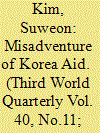

|
|
|
|
|
| Summary/Abstract |
Korea Aid was a development project delivering Korean medical services, food and pop music via trucks to rural communities in Africa. The project was poorly conceived, vulnerable to corruption and ultimately ineffective. While Korea Aid marked a backward step for Korea’s development cooperation, revealing many of the challenges associated with emerging donors, it also reflected Korea’s aspiration to become a cultural and developmental alternative to hegemonic nations. This paper examines the historical circumstances that led to the formation of Korea Aid, and further argues that Korea Aid embodied a synthesis of ‘cultural soft power’ and ‘developmental soft power’ intended to create the perception of Korea as culturally and developmentally attractive and benign. Korea’s current pursuit of developmental soft power intentionally transforms the country’s development experience into a ‘politically odourless’ model, masking its authoritarian undercurrent and in turn camouflaging growing aspirations to expand its global influence.
|
|
|
|
|
|
|
|
|
|
|
|
|
|
|
|
| 5 |
ID:
168490
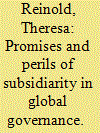

|
|
|
|
|
| Summary/Abstract |
In the messy world of global governance, the principle of subsidiarity has the potential to order relations between different layers of governance as well as compensate for the legitimacy deficit of global governance institutions. However, subsidiarity has received surprisingly little scholarly attention in the discipline of International Relations. This article therefore seeks to examine the promises and perils of subsidiarity in global governance by adducing empirical evidence from Africa, a region which has authored norms and policies that often contest global norms and institutions. Based on two case studies of pro-democratic intervention in The Gambia and court proliferation at the (sub-)regional levels, the article concludes that while subsidiarity may strengthen democracy and the rule of law at the national level, it may also undermine the rule of law at the global level, as well as dilute fundamental global norms that serve to protect basic human rights. At the same time, subsidiarity provides opportunities for normative innovation, which suggests that more attention needs to be paid to the law-generating effects of subsidiarity and to the Global South as an agent of change in international law and global governance.
|
|
|
|
|
|
|
|
|
|
|
|
|
|
|
|
| 6 |
ID:
168489
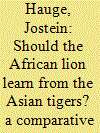

|
|
|
|
|
| Summary/Abstract |
Ethiopia’s economy has been growing at breakneck speed for well over a decade now, earning the nickname as Africa’s lion. In recent years, the development literature on Ethiopia has paid particular attention to the role of industrial policy, especially the ways in which the Ethiopian experience compares to that of the Asian tigers. But through this comparative-historical perspective, little attention has been devoted to an important aspect of industrial policy in Ethiopia – foreign direct investment (FDI) in the manufacturing sector. This paper compares FDI-oriented industrial policy in Ethiopia in the current era (particularly focusing on light manufacturing) to that of South Korea and Taiwan between 1960 and 1990, arguably the two most generalisable cases among the Asian tigers. The paper argues that FDI-oriented industrial policy in Ethiopia seems to be bringing about short-term economic benefits, and is showing promise for further industrialisation. At the same time, it could benefit from taking more lessons from the long-term economic development perspective that characterised South Korea’s and Taiwan’s approach to FDI. Such a long-term perspective most importantly includes pro-active strategies to transfer technology from foreign firms to the domestic economy and the creation of backward linkages from foreign to domestic firms.
|
|
|
|
|
|
|
|
|
|
|
|
|
|
|
|
| 7 |
ID:
168487
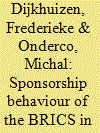

|
|
|
|
|
| Summary/Abstract |
The formation of informal groupings of states is a manifestation of the global shift in economic power. One such a grouping is the BRICS, consisting of Brazil, Russia, India, China and South Africa, which stands out for its importance due to its economic weight, its coverage across continents and the numerous internal differences. The BRICS have collectively flexed their muscle and expressed their intentions to extend their cooperation at the United Nations (UN). Proposals in the United Nations General Assembly (UN GA) take the form of resolutions, which can be written and co-written by the UN member states. This so-called sponsoring of resolutions is a way to push agenda items forward. Using a large-N network analysis, we examine the patterns of co-sponsorship of the BRICS of resolutions adopted in the UN GA plenary sessions. We find that the BRICS cooperate on fields such as economic issues, however, they do not form a coherent bloc when it comes to resolution sponsorship. These results raise the question in what way the BRICS actually cooperate at the UN level.
|
|
|
|
|
|
|
|
|
|
|
|
|
|
|
|
| 8 |
ID:
168484
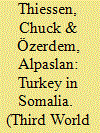

|
|
|
|
|
| Summary/Abstract |
Turkey’s humanitarian and development intervention in Somalia is unusually illuminating as a case study to investigate the relations between emerging and conventional interveners in conflict zones since, in this case, Turkey’s intervention carries adequate impetus to resist assimilation with conventional North/Western counterparts. Our starting point is the observation that Turkish and conventional humanitarian and development interveners have struggled to coordinate or cooperate in Somalia. This article investigates what this uncooperative and uncoordinated organisational behaviour means, and we root our investigation in 21 face-to-face interviews with officials working inside the Turkish and conventional intervention in Mogadishu and Nairobi to inquire about how they understand and theorise this discordant behaviour. We use a parsimonious analytical framework of trustworthiness that questions the ‘ability’ and ‘integrity’ of counterpart organisations to explore the intentions behind organisational behaviours. Our analysis of interview narratives evidences challenges to conventional methods of intervention by Turkish organisations and the protection of the same by North/Western organisations. Our concluding discussion interprets these findings in relation to consequences for the status quo hierarchy of global governance and its promotion of liberal intervention norms, and for the utilisation of securitised and remote-control intervention methodologies in conflict zones such as Somalia.
|
|
|
|
|
|
|
|
|
|
|
|
|
|
|
|
| 9 |
ID:
168485
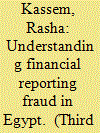

|
|
|
|
|
| Summary/Abstract |
This study expands our knowledge and understanding of financial reporting fraud in Egypt by drawing on the perceptions of experienced international and Big 4 auditors in that country. In particular, it explores (1) how common financial reporting fraud is in Egypt, (2) the perpetrators and victims of financial reporting fraud in Egypt and (3) how financial reporting fraud is committed and concealed in Egypt. The study sheds light on generic issues that could have implications for auditors and audit regulators. In addition, the study provides a detailed guide on how financial reporting fraud schemes are committed and concealed in Egypt, knowledge of which could help auditors design effective audit tests to assess fraud risk and help those charged with governance to design effective prevention and detection techniques. Egypt could be an attractive destination for international investors, therefore knowledge of the nature and victims of fraud in Egypt could help investors make informed decisions about where to invest their money. The results of this study could also help regulators in Egypt as well as World Trade Organizations determine where to focus their support and enforcement efforts.
|
|
|
|
|
|
|
|
|
|
|
|
|
|
|
|
|
|
|
|
|